Key takeaways:
- Compliance training is crucial in the cannabis industry, emphasizing ethical practices and the importance of adhering to regulations to build consumer trust.
- Continuous education and clear communication are essential for staying updated on changing regulations, fostering a culture of responsibility within organizations.
- Practical tools, like checklists and an open-door policy, enhance compliance efforts and encourage team collaboration and proactive problem-solving.
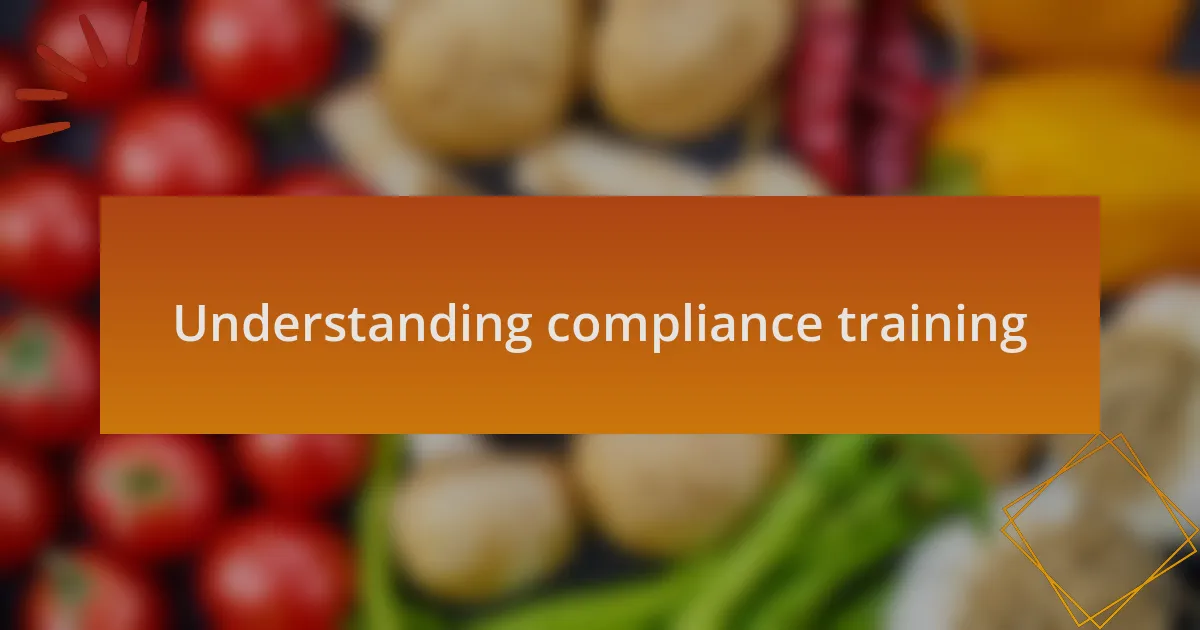
Understanding compliance training
Compliance training is essential in any regulated industry, including cannabis edibles. I remember my first session; it felt overwhelming yet enlightening, as I grasped the importance of adhering to legal standards that not only protect businesses but also consumers. Have you ever thought about how failing to comply can impact not only a brand’s reputation but also its survival in the market?
In the cannabis industry, compliance is not just about following the law; it’s a commitment to ethical practices. During my training, I realized that every regulation serves a purpose, whether it’s ensuring product safety or maintaining transparent labeling. It struck me how easy it is to overlook these details, yet they’re crucial for fostering trust with customers.
Moreover, navigating the compliance landscape can be daunting, and I often found myself asking, “What if I miss something important?” This fear can be paralyzing, but I learned that thorough training and continuous education empower individuals to make informed decisions. Each session became a stepping stone towards not just understanding the laws but embracing them as a vital part of our professional ethos.
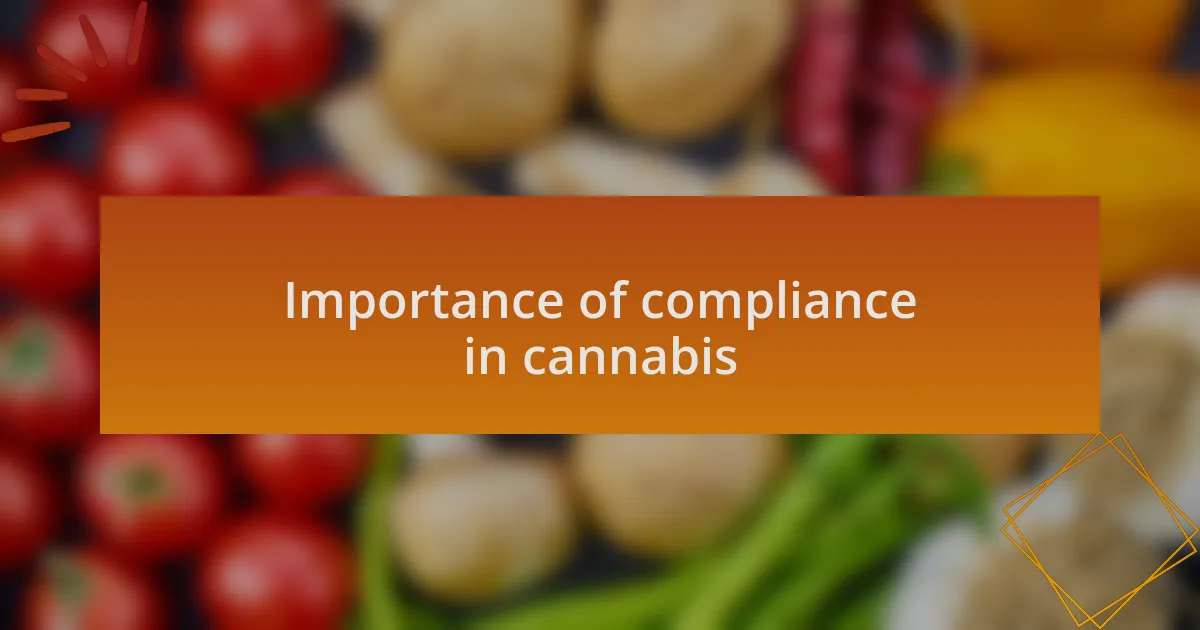
Importance of compliance in cannabis
In the cannabis industry, compliance isn’t merely a checkbox on a to-do list; it’s a foundational pillar that upholds the integrity of the entire market. I’ll never forget the moment I realized that a single oversight could ripple through the entire supply chain, potentially endangering consumers. How could I, in good conscience, be part of a movement that didn’t prioritize the health and safety of our community?
I once attended a workshop that emphasized the importance of thorough record-keeping. As I listened to the instructor, I felt a mix of fear and urgency; every transaction and product batch held implications far beyond the day-to-day operations. It was a stark reminder that compliance helps prevent not only legal issues but also cultivates a culture of accountability within organizations. Isn’t it reassuring to know that our commitment to these practices can genuinely impact the lives of our customers for the better?
Furthermore, compliance shapes consumer perceptions and trust, which, as I learned, can make or break a brand. I recall a discussion about a company that faced backlash for non-compliance and how it drastically affected their sales. It made me think: how can we build a loyal customer base if we don’t prioritize our responsibilities? Ultimately, being compliant is more than just avoiding penalties; it’s about creating lasting relationships founded on trust and respect.
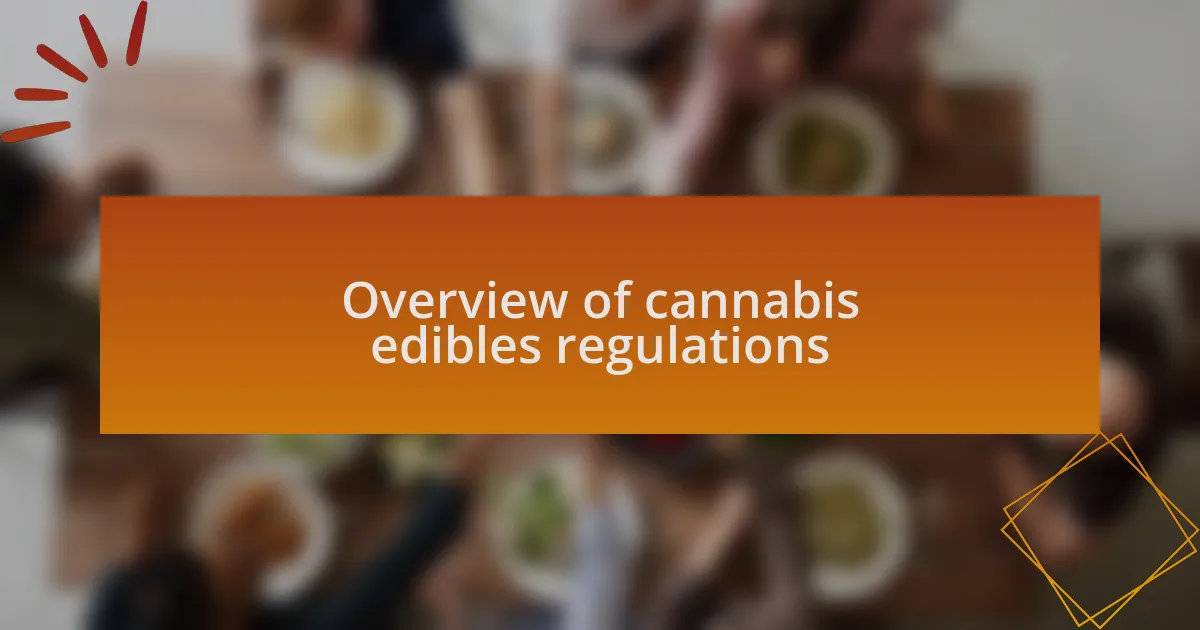
Overview of cannabis edibles regulations
In navigating the complex landscape of cannabis edibles regulations, I’ve often been struck by the sheer variety of rules that vary from state to state. For example, in some areas, the legal limit on THC concentration can dramatically shape product formulation. How thrilling and, at times, daunting it felt to adapt to those shifting guidelines while ensuring that the products meet the highest standards of safety and efficacy.
I cannot recall a time when understanding labeling requirements didn’t feel like a high-stakes puzzle. For instance, the regulations dictate clear dosage instructions, which are essential in preventing accidental overconsumption. Have you ever considered how vital it is for consumers to know exactly what they’re getting? It creates peace of mind, and I find that deeply satisfying.
Moreover, the regulations surrounding packaging and child-resistance have taught me valuable lessons about consumer safety. I vividly remember discussing with a colleague how bright, appealing packaging can attract consumers, but it must also be responsibly designed to keep products out of the hands of children. This realization refocused my approach to compliance, reminding me that thoughtful practices can genuinely save lives.
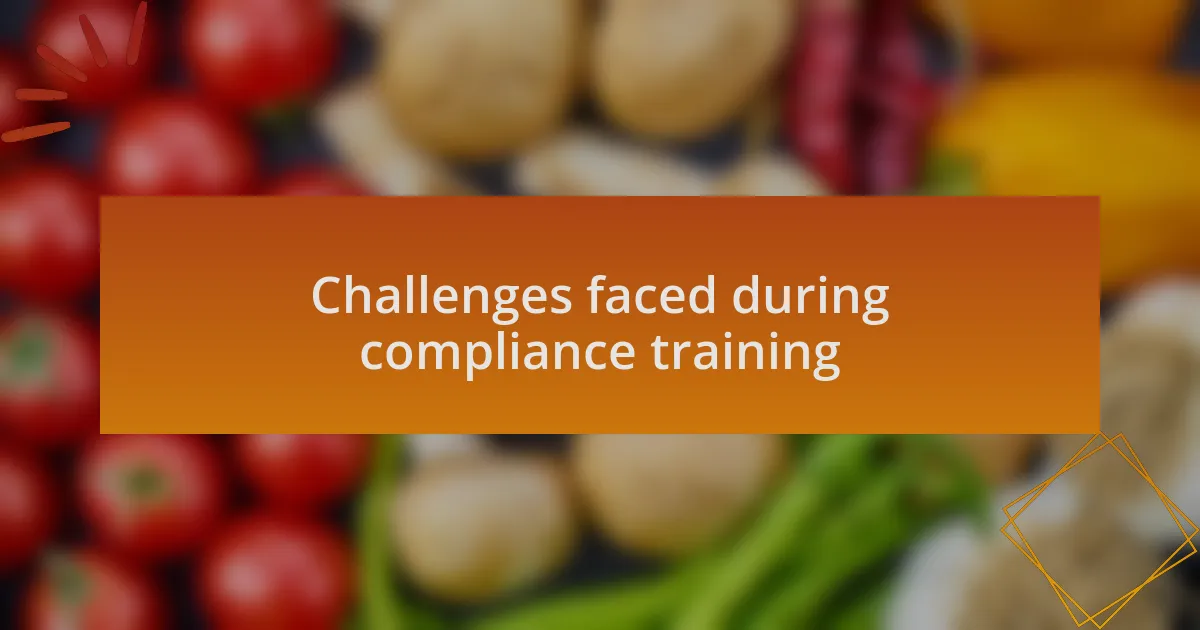
Challenges faced during compliance training
The path through compliance training was laden with unexpected hurdles. One particularly challenging moment was when I came across conflicting regulations regarding ingredient sourcing. As I sifted through the various guidelines, I couldn’t help but wonder: How was I to ensure that every ingredient met the compliance standards while maintaining product quality? It felt like balancing on a tightrope, where one misstep could lead to serious consequences.
Another frustration I faced involved the intricacies of employee training. I vividly recall a session where we delved into the legal ramifications of non-compliance. It was tough to keep everyone engaged while stressing the importance of adhering to these regulations. Have you ever watched a room full of people glaze over during a presentation? I knew I needed to find innovative ways to convey the gravity of compliance without diluting the information.
Perhaps the most significant challenge was staying updated with ever-changing laws. I remember one week when three new amendments came out just as I was finishing training on the previous ones. How does one keep pace with such rapid changes? It was exhausting but also incredibly motivating, pushing me to foster a culture of continuous learning within my team. Adapting to this relentless pace has taught me resilience, reinforcing my commitment to compliance in the ever-evolving landscape of cannabis edibles.
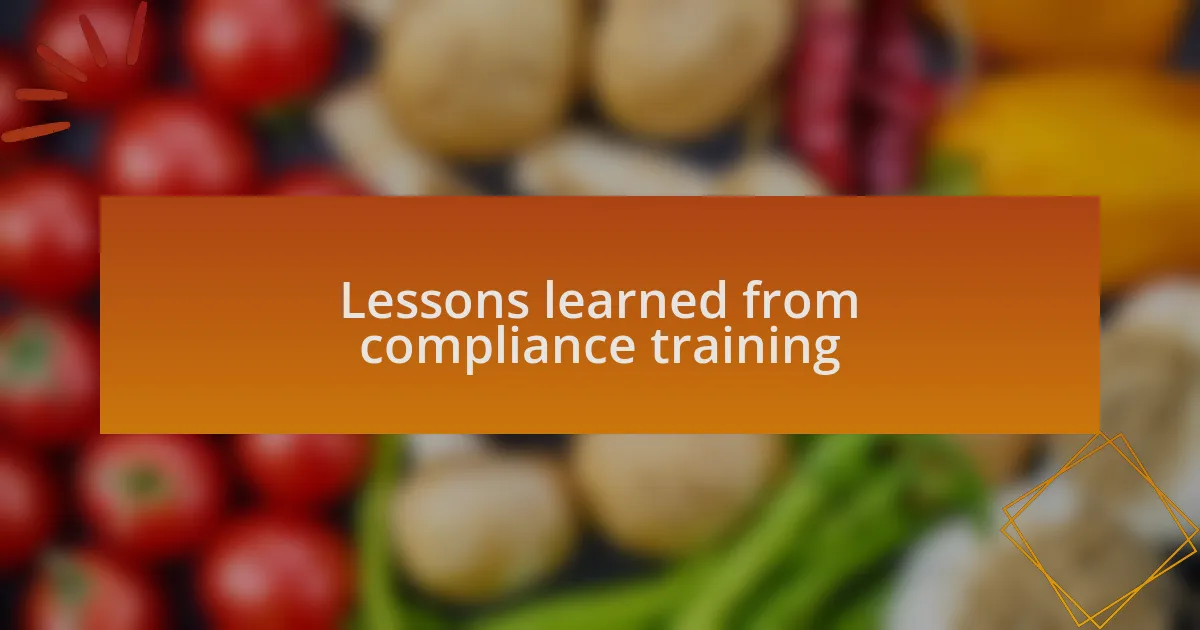
Lessons learned from compliance training
The compliance training experience taught me the critical importance of clear communication. I recall a specific instance when a lack of clarity in guidelines led to confusion among the team about labeling requirements. It was a moment of frustration, but it highlighted how essential it is to create straightforward resources and open channels for questions. Have you ever felt that a simple explanation could have saved a lot of hassle? I certainly have. This realization helped me prioritize transparency and accessibility in compliance-related discussions.
Another lesson I absorbed was the value of collaborative learning. During group discussions, I noticed that different team members brought unique perspectives and insights. For instance, a colleague with a background in food science offered a fresh take on dosage accuracy, which ultimately enhanced our approach to product formulation. It made me reflect on the power of diverse expertise—how much could we gain by welcoming different voices to the table? This reinforced my belief that compliance training should not just be a top-down mandate but a collaborative journey where everyone contributes.
Finally, I learned that compliance is not merely about following rules; it’s about fostering a culture of responsibility. I remember the pride I felt when our team successfully navigated a challenging audit because we were all on the same page. That experience taught me that when we view compliance as a shared goal rather than a checklist, it transforms the mindset within the organization. How could we create more of those moments where everyone feels empowered to uphold our standards? This perspective shifted how I approached compliance training, emphasizing that it should inspire rather than intimidate.
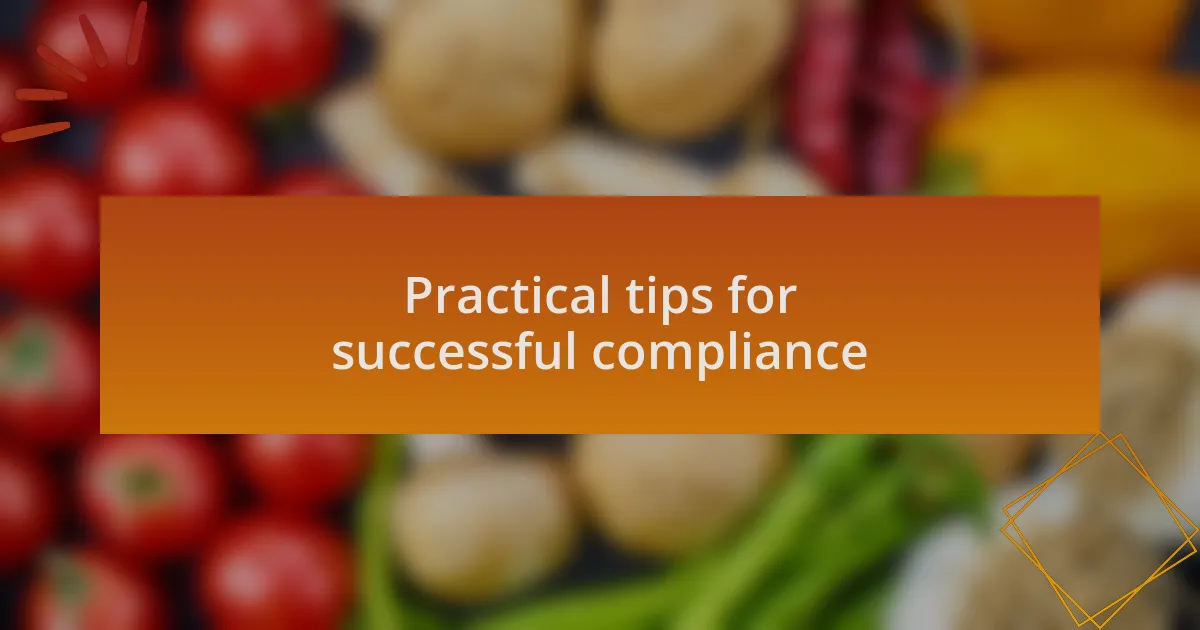
Practical tips for successful compliance
When it comes to ensuring compliance in the cannabis edibles sector, I find that developing a robust checklist is essential. I remember once crafting a simple checklist for labeling requirements, which transformed our workflow. This straightforward tool not only helped my team stay organized but also reduced the likelihood of errors. Have you ever experienced the relief that comes from having a reliable guide in a complex process? It’s a game changer.
Another practical tip I’ve embraced is the power of ongoing education. Compliance shouldn’t be a one-time training session but a continuous conversation. I’ve experienced firsthand how hosting regular workshops can invigorate a team’s understanding of evolving regulations. By creating a culture of continual learning, we remain agile and informed, ready to adapt when new challenges arise. Isn’t it comforting to know we can evolve alongside the compliance landscape?
Lastly, fostering an open-door policy has been invaluable for my team. Encouraging questions and discussions without judgment builds trust and ultimately strengthens our compliance efforts. I’ve seen how team members feel more comfortable voicing concerns, which leads to proactive problem-solving. Have you noticed how a simple chat can clear up misunderstandings? I believe that transparency in communication creates a foundation of confidence, essential for maintaining compliance in this ever-changing industry.